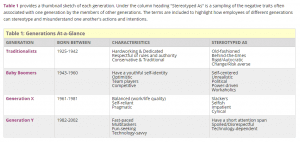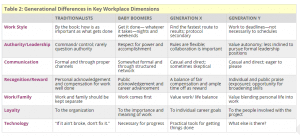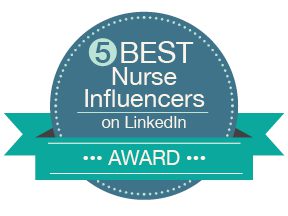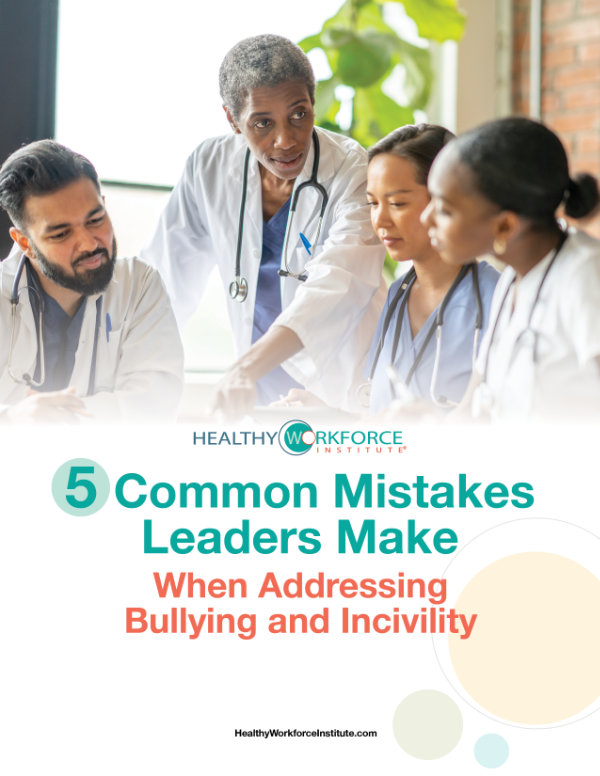Imagine an employee who brings enthusiasm and energy, shares fresh ideas and new approaches, displays wisdom that typically comes with years of experience, demonstrates unflagging loyalty to the organization and refuses to take “no” for an answer when pitching a breakthrough idea. Realistically, the chance of finding all these characteristics in a single employee is practically zero; however, these same desirable characteristics, and many more, can be found in today’s multi-generational workforce.
Talkin’ Bout My Generation
Four years ago I took a leap of faith and went back to the bedside. I made this decision because for me to be effective (teaching certification, ending nurse-to-nurse bullying, etc.) I need to know what nurses are going through. It was one of the hardest but best decision I’ve ever made. I’m a bedside nurse at heart and LOVE patient care.
After about 6 months working on a neuro-trauma step down unit, I noticed that 75% of the nurses had less than 2 years experience and were in their early twenties (the “M” generation). Many days I would leave work saying, “They don’t even know what they don’t know.” I also noticed that the older nurses who had been there since they broke ground, kept to themselves and didn’t interact very much with their younger colleagues.
My first thought was…WHY AREN’T THEY LEARNING FROM EACH OTHER???
For the first time in recent history, there are four generations of employees represented in the U.S. workforce. It is the largest demographic shift since women and members of minority groups began entering the workforce in significant numbers several decades ago. Not surprisingly, the implications are as profound now as they were then. Against the backdrop of gender, race and ethnicity, generational differences bring a new level of complexity—and new opportunity—to the notion of what it is to manage a diverse workforce.
Many Boomers plan to continue working past traditional retirement age and many will still be in positions of leadership. The things important to Millennials and Generation Xers, and increasingly to Boomers as well—like work-life balance, flexible scheduling, rewards for results, and options to work from home—will become more integral parts of the workplace culture.
Let Go of the Stereotypes
There’s a tradition of viewing young people as rude, disrespectful, violent and ill-mannered. The facts show that young people today are generally positive, respectful, patriotic, and goal-oriented. On the other hand, a youth-focused culture can cause people to devalue older workers.

[easy-tweet tweet=”The facts show that young people today are generally positive, respectful, patriotic, and goal-oriented. “]
If managers start the generations’ conversation—by doing things like offering training on generational differences—employees stop judging and find the positives in their differences. Creativity, productivity and morale increase.
Adopt the Modified Golden Rule
Perhaps the most useful skill we can adopt for showing respect is a modified Golden Rule: Do unto others, keeping their preferences in mind.
Most people have heard of the Golden Rule: Do unto others as you would have them do unto you.
The Golden Rule works well when dealing with someone who has the same background, style and preferences. The Golden Rule may not work as well when applied to someone from another generation.
When communicating with a colleague from another generation, it is critical to remember that he or she likely has different preferences and interests. It’s a matter of adapting to the other person’s preferences instead of sticking with one’s own personal style.

When communicating with a member of the World War II Generation:
Words and tone of voice should be respectful, with good grammar, clear diction, no slang or profanity. Language should be a bit formal and professional, and the message should relate to company history and long-term goals.
When communicating with a Baby Boomer:
This conversation should be more relational, perhaps over coffee or lunch. Boomers tend to see relationship and business results as intertwined. Ask about mutual interests (e.g. “How is your son doing in college?”). Make the conversation participative by getting the other’s input, and link the message to the team or individual vision, mission, and values.
When communicating with a Generation Xer:
Don’t waste the person’s time. Be direct and straightforward. Avoid corporate-speak. Send an email or leave a voicemail that states clearly what you want, how it will serve the Generation Xer, and when you want it.
When communicating with a Millennial:
Be positive. Send a text message or meet face-to-face. Tie the message to the Millennial’s personal goals or to the goals the whole team is working toward. Don’t be condescending. Avoid cynicism and sarcasm.
How can we ease the tensions between our multigenerational teams?
Pursue different perspectives. Many work teams would say they tolerate differences, but the mixed-generation teams that truly succeed go beyond tolerance.
We can help people become more aware and accepting of generational differences! Let’s all learn from each other and create an attitude of respect for all generations!
Thanks so much for reading. Take care. Be kind and stay connected.


If you like this post, I recommend the following:
Share with your colleagues and friends using the social share buttons.
Subscribe to my blog. Sign up to receive my latest updates and other resources via my website.
Dr. Renee Thompson works with healthcare organizations that want to overcome the leadership and clinical challenges their people face every day.
If you’d like to find out more about her programs, please visit her website www.reneethompsonspeaks.com.
Contact Renee today at [email protected] to bring her to your organization to talk about ending the cycle of nurse bullying.













4 thoughts on “Managing Different Generations? Here’s The Secret To Success!”
4.5
Great points. I’m a millennial and I too noticed that in both of the departments I’ve worked in there were two distinct groups, the older nurses, and the brand new ones without a lot of experience.
I know there was often a lot of hate thrown back and forth, the younger ones complaining because they got all the tough assignments, the older ones complaining that the new ones had to pay their dues, etc.
I tried to stay out of all the politics, and just help everyone as much as I could, and I will also say that the older nurses saved my butt a bunch of times with their clinical knowledge. But I gotta admit that sometimes I did feel like I was getting abused. How do you reconcile standing up for yourself, but not seeming like a jerk at the same time?
Great points Daniel. I really think that it’s how you approach each other right from the beginning. If I were a new nurse now, I would acknowledge the wisdom and experience of the older nurses and ask them for their help, guidance, and support. If I were an older experienced nurse (which I am), I would tell the newer nurses that I know a lot…but I don’t know everything…but together, we are a powerful team.
I think the best way to stand up for yourself is to have the courage to admit that you DON’T know everything and that you are open to learning from others – no matter what generation you are.
5